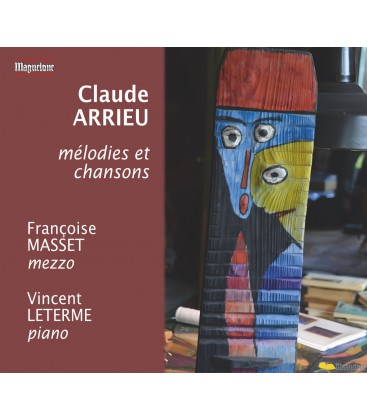Claude ARRIEU : Melodies and piano pieces
Melodies by Claude ARRIEU
& some pieces for piano.
Françoise MASSET, mezzo
Vincent LETERME, piano
with the participation of Didier HENRY.
Claude Arrieu, born in 1903, began her music education at a very young age (music theory and piano).
By 1924, she continued her musical studies at the Conservatoire de Paris, focusing on harmony, fugue, and counterpoint.
She notably worked under the guidance of Georges Caussade and Noël Gallon. In 1928, she became a student of Paul Dukas, who was then directing the composition class, in which she won a first prize in 1932.
Claude Arrieu had a considerable body of work, and the diversity of the scores she wrote reflects her interest in all musical genres: symphonic music, chamber music, pieces for piano, melodies, songs, choral music, operas, ballet music, musical theater, film music, radio works.
With a cheerful and lively nature, she wrote music whose scores are a true reflection of her personality: “[a] mischievous fantasy, [a] completely unrestrained joy, [an] ironic humor, [an] elegance of lines without smudges, [a] determined and purposeful tone” (Robert Bernard).
Her curiosity led her to take an interest in literature from a young age. A passionate reader, she set to music the verses of Paul Eluard, Louise de Vilmorin, Francis Jammes, and Jean Cocteau. These are writers she met and with whom she greatly enjoyed working.
This love for words was accompanied by a preference for theater. Without disdain for the classics (Gérard de Nerval, Shakespeare, Voltaire), she contributed to promoting her contemporaries (André Obey, Michel Vaucaire, Jean Tardieu, Federico Garcia Lorca) and adapted with perfect taste to each style of libretto. Her music musically translates not only the words but also the spirit and atmosphere of the literary work.
Firmly rooted in her time, she joined radio in 1935 and enthusiastically participated in the productions of the Studio d’Essai, created in 1942 by Pierre Schaeffer, “a true bastion of musical resistance” (Catherine Morgan). In 1946, this Studio became the Club d’Essai of the RTF, with Jean Tardieu as its artistic director, “charged with ‘governing’ a ‘little enchanted island where all the sounds, all the words of life and the imaginary flowed’.”
Throughout her life, Claude Arrieu composed while remaining true to herself and maintaining her independence, far from trends and fashions. Little swayed by lyrical effusions, she preferred measure, clarity, and transparency. An indefatigable composer-craftsman, she embraced Voltaire’s assertion – Pangloss: “when man was placed in the Garden of Eden, he was placed there, ut operaretur eum, to work.” This work was her vocation and her passion. She cultivated her garden, out of love for art and confidence in her profession.







!["Transalpin" [le Spectacle]](https://www.maguelone.fr/522-thumb_default/transalpin-le-spectacle-.jpg)






!["Transalpin" [le Spectacle]](https://www.maguelone.fr/522-medium_default/transalpin-le-spectacle-.jpg)